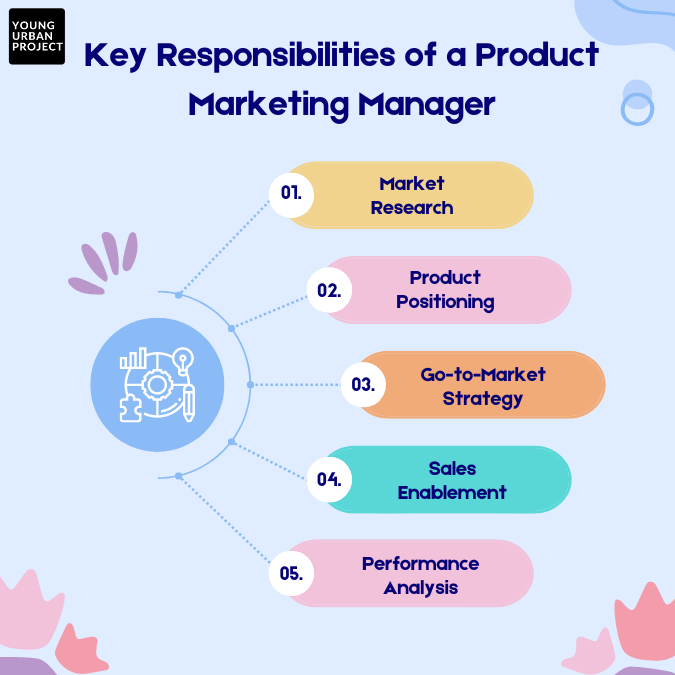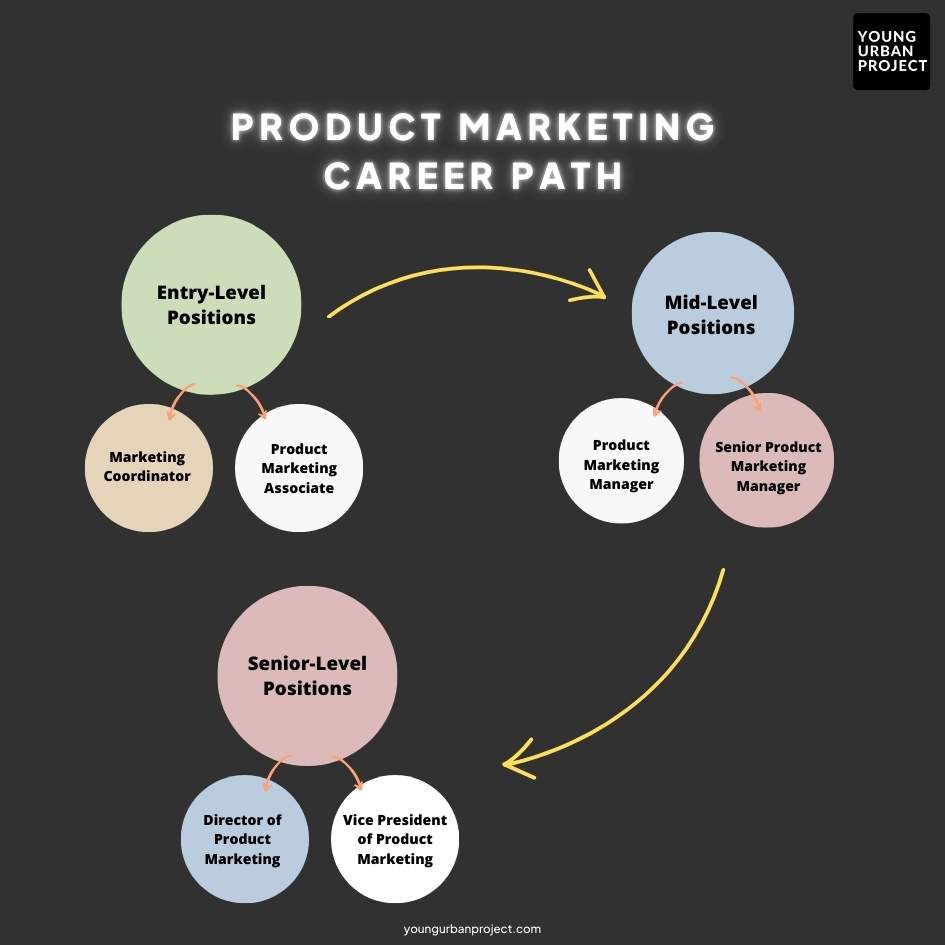If you are looking to make a career in product marketing and want to know what a Product Marketing career path looks like, this is the right article for you.
The path to becoming a successful product marketer involves strategic planning, continuous learning, and practical experience. This comprehensive guide provides a clear product marketing career roadmap, helping you navigate the steps to achieving your dream job.
Table of Contents
Understanding the Role of a Product Marketer
What is Product Marketing?
Product marketing is the process of bringing a product to market, promoting it, and ensuring it meets the needs of customers. It involves market research, competitive analysis, positioning, messaging, and strategic planning. Product marketers work closely with various teams, including sales, product development, and customer support, to ensure the product’s success.
Key Responsibilities of a Product Marketing Manager (PMM)

- Market Research: Understanding customer needs, market trends, and competitive landscape.
- Product Positioning: Defining the unique value proposition and differentiating the product in the market.
- Go-to-Market Strategy: Planning and executing product launches, campaigns, and promotions.
- Sales Enablement: Equipping sales teams with the tools and knowledge to sell the product effectively.
- Performance Analysis: Monitoring product performance and making data-driven decisions for continuous improvement.
Building Your Product Marketing Career Path
Educational Background and Skill Development
- Educational Requirements
While there isn’t a strict requirement for a specific degree to enter product marketing, certain fields of study can provide a strong foundation. Degrees in business, marketing, communications, and psychology are particularly relevant. These programs typically cover essential topics such as consumer behavior, market research, and strategic marketing, which are directly applicable to product marketing roles.
Relevant Coursework
When selecting your courses, focus on subjects that enhance your understanding of marketing principles and analytical skills. Key courses include:
- Market Research and Analysis: Learn techniques for gathering and analyzing market data to make informed decisions.
- Consumer Behavior: Study the psychological factors that influence buying decisions.
- Digital Marketing: Gain insights into online marketing strategies, including social media, SEO, and email marketing.
- Business Strategy: Understand how to develop and implement strategies that align with business goals.
- Communication and Persuasion: Develop skills in crafting compelling messages and presentations.
Advanced Degrees and Certifications
For those looking to advance further, pursuing an MBA with a focus on marketing can be beneficial. MBA programs often offer specialized courses in product management, strategic marketing, and leadership, providing a deeper understanding of business operations and marketing strategies.
Additionally, consider obtaining certifications in product marketing or related areas. Certifications such as the Certified Product Marketing Manager (CPMM) or credentials from institutions like the Product Marketing Alliance can demonstrate your expertise and commitment to the field.
Importance of Continuous Learning
The field of product marketing is dynamic and constantly evolving. Keeping up with the latest trends, technologies, and techniques is critical. Enroll in online courses, attend workshops, and participate in webinars to keep your skills current. Platforms like Young Urban Project and LinkedIn Learning offer numerous courses on various aspects of marketing and product management.
2. Gaining Relevant Experience
Experience is a vital component of a product marketing career roadmap. Internships, entry-level positions, and involvement in cross-functional projects provide practical insights and skills.
Entry-Level Roles
- Marketing Coordinator: Assists with marketing campaigns and market research.
- Product Marketing Specialist: Focuses on specific aspects of product marketing, such as content creation or competitive analysis.
Mid-Level Roles
- Product Marketing Manager: Oversees marketing strategies for one or more products.
- Senior Product Marketing Manager: Leads teams and develops comprehensive marketing plans.
Advanced Roles
- Director of Product Marketing: Sets the strategic direction for the marketing team.
- Vice President of Marketing: Oversees the entire marketing department, including product marketing.
3. Developing Key Skills
Analytical Skills
Analytical skills are crucial for product marketers as they enable you to interpret data and make informed decisions. You’ll need to be proficient in analyzing market trends, customer behavior, and competitive landscapes. Tools like Google Analytics, Tableau, and Excel are essential for gathering and interpreting data. Developing these skills will help you identify opportunities, understand market needs, and measure the effectiveness of your marketing strategies.
Communication Skills
Product marketing relies heavily on effective communication. You must be able to convey the product’s value proposition clearly and compellingly to different audiences, including customers, sales teams, and stakeholders. This involves writing persuasive copy for marketing materials, creating engaging presentations, and delivering impactful messages across various channels. Practicing public speaking, writing, and visual storytelling can significantly enhance your communication skills.
Project Management
Product marketing involves coordinating multiple projects and working with cross-functional teams. Strong project management skills are essential to ensure that product launches and marketing campaigns are executed efficiently and on time. Familiarize yourself with project management methodologies such as Agile or Scrum, and use tools like Trello, Asana, or Monday.com to keep track of tasks, deadlines, and team collaboration. Effective project management helps you stay organized and ensures that all aspects of your marketing strategy are aligned and executed smoothly.
Digital Marketing
In today’s digital age, understanding digital marketing channels and techniques is vital for product marketers. This includes knowledge of SEO, SEM, social media marketing, email marketing, and content marketing. Being proficient in these areas allows you to reach and engage your target audience effectively. Utilize platforms like Google Ads, Facebook Ads, and HubSpot to run and analyze digital marketing campaigns. Staying current with the latest digital marketing trends and best practices will give you a competitive edge.
Strategic Thinking
Strategic thinking involves understanding the big picture and making decisions that align with long-term business goals. As a product marketer, you need to develop strategies that position your product effectively in the market, anticipate market trends, and respond to competitive pressures. This requires a deep understanding of your market, customers, and competitors. Practice thinking critically about your product’s place in the market and develop strategic plans that drive growth and customer satisfaction.
Creativity and Innovation
Creativity and innovation are essential for developing compelling marketing campaigns and differentiating your product from the competition. This involves brainstorming new ideas, experimenting with different approaches, and thinking outside the box to solve problems. Encourage creativity by staying open to new ideas, seeking inspiration from various sources, and fostering a culture of innovation within your team. Creative thinking can lead to unique marketing strategies that capture attention and drive engagement.

4. Networking and Professional Development
The Importance of Networking
Networking is a vital component of professional growth in product marketing. Building a strong professional network can open doors to job opportunities, mentorship, and industry insights. It allows you to connect with peers, share knowledge, and stay updated on the latest trends and best practices in product marketing.
Industry Associations and Professional Groups
Joining industry associations and professional groups is an excellent way to expand your network. Organizations such as the Product Marketing Alliance, the American Marketing Association (AMA), and the Product Development and Management Association (PDMA) offer valuable resources, events, and networking opportunities. Membership in these groups can provide access to exclusive content, industry reports, and professional development programs.
Attending Conferences and Workshops
Conferences and workshops are prime opportunities for networking and professional development. Events like the Product Marketing Summit, SaaStr Annual, and INBOUND bring together industry leaders, innovators, and practitioners. Attending these events allows you to learn from experts, discover new tools and techniques, and connect with like-minded professionals. Participating in workshops also provides hands-on experience and practical skills that can be directly applied to your work.
Online Forums and Social Media
Engage in online forums and social media platforms to connect with other product marketers globally. LinkedIn, Twitter, and specialized forums like Reddit’s r/ProductMarketing are excellent places to start. Join discussions, share your insights, and learn from others. Engaging in these communities can lead to valuable connections and keep you informed about industry news and trends.
Mentorship and Peer Learning
Finding a mentor can drastically speed up your professional progress. A mentor can provide guidance, share their experiences, and offer advice on navigating challenges in your career. Look for mentors within your organization or through industry associations and professional networks. Additionally, peer learning groups or mastermind groups can provide a supportive environment to exchange ideas, discuss challenges, and learn from each other’s experiences.
Continuing Education and Certifications
Investing in your education is essential for staying competitive in the product marketing field. Pursue certifications and advanced courses to deepen your knowledge and skills. Certifications such as Certified Product Marketing Manager (CPMM), offered by the Association of International Product Marketing and Management (AIPMM), or certifications from the Product Marketing Alliance can enhance your credentials. Online platforms like Coursera, Udemy, and LinkedIn Learning offer courses in product marketing, digital marketing, data analytics, and more.
Personal Branding
Building a personal brand is crucial for establishing yourself as a thought leader in product marketing. Create a professional online presence through LinkedIn and other social media platforms. Share your expertise by writing articles, participating in webinars, and speaking at industry events. A strong personal brand can increase your visibility, attract new opportunities, and position you as an authority in your field.
Product Marketing Career Path

Entry-Level Positions
1. Marketing Coordinator: As a Marketing Coordinator, you’ll assist in the execution of marketing campaigns and initiatives. This role provides foundational experience in coordinating marketing activities, conducting market research, and supporting the development of marketing materials.
2. Product Marketing Associate: As a Product Marketing Associate, you’ll collaborate closely with the product marketing team to assist in market research, competitive analysis, and the development of go-to-market strategies. This role involves supporting product launches, creating marketing collateral, and analyzing market trends to effectively position products in the market.
Mid-Level Positions
1. Product Marketing Manager: As a Product Marketing Manager, you’ll take a lead role in developing and executing go-to-market strategies for specific products or product lines. Responsibilities include market segmentation, messaging and positioning, pricing strategies, and collaboration with cross-functional teams to drive product success.
2. Senior Product Marketing Manager: In this role, you’ll oversee multiple product lines and lead strategic initiatives to drive growth and market penetration. Senior Product Marketing Managers often mentor junior team members, contribute to high-level marketing strategy development, and collaborate closely with senior leadership to align product marketing efforts with overall business objectives.
Senior-Level Positions
1. Director of Product Marketing: As a Director of Product Marketing, you’ll be responsible for setting the strategic direction for the product marketing function within the organization. This role involves defining product marketing strategies, allocating resources, and overseeing the execution of comprehensive go-to-market plans. Directors of Product Marketing play a pivotal role in driving product innovation, market expansion, and revenue growth.
2. Vice President of Product Marketing: At the executive level, Vice Presidents of Product Marketing oversee the entire product marketing function across the organization. They provide leadership and strategic guidance to multiple product marketing teams, collaborate with C-suite executives on business strategy, and ensure alignment between product marketing initiatives and company goals. Vice Presidents of Product Marketing play a critical role in shaping the organization’s market positioning and driving competitive advantage in the industry.
Key Skills for Career Advancement
To advance in your product marketing career, cultivate the following key skills:
- Leadership and Strategic Thinking: Develop the ability to think strategically, anticipate market trends, and make informed decisions that align with business objectives.
- Cross-Functional Collaboration: Strengthen your ability to collaborate effectively with teams across sales, product development, customer support, and executive leadership to drive cohesive product marketing strategies.
- Market Analysis and Insight: Hone your skills in market research, competitive analysis, and customer insights to inform product positioning and go-to-market strategies effectively.
- Communication and Influence: Master the art of crafting compelling narratives, delivering impactful presentations, and influencing stakeholders to support your product marketing initiatives.
- Adaptability and Innovation: Stay agile in response to market changes, embrace innovation in marketing strategies, and continuously seek opportunities to differentiate products and capture market share.
Navigating Challenges in a Product Marketing Career
Staying Updated with Market Trends
The business environment is continuously changing. Stay up to date on industry developments, emerging technology, and changing consumer behaviors. Continuous learning is critical to sustaining a competitive advantage.
Balancing Creativity and Data-Driven Decision Making
Effective product marketing requires a blend of creativity and analytical thinking. Use data to inform your strategies, but also be willing to take calculated risks and innovate.
Managing Cross-Functional Teams
Product marketers often work with diverse teams across the organization. Developing strong interpersonal and leadership skills is essential for effective collaboration and achieving common goals.
Leveraging Tools and Resources for Product Marketing Success
Market Research Tools
Utilize tools like SurveyMonkey, Qualtrics, and Google Analytics to gather and analyze market data. Understanding your audience’s needs and preferences is key to developing effective marketing strategies.
Project Management Software
Tools like Trello, Asana, and Monday.com can help manage tasks, timelines, and team collaboration. Efficient project management ensures that marketing campaigns are executed smoothly and on time.
Marketing Automation Platforms
Platforms such as HubSpot, Marketo, and Pardot streamline marketing processes, from lead generation to customer engagement. Automation can save time and improve the effectiveness of your marketing efforts.
Building a Personal Brand in Product Marketing
The Importance of a Personal Brand
In the competitive field of product marketing, establishing a strong personal brand can set you apart from others. A well-crafted personal brand showcases your expertise, builds credibility, and positions you as a thought leader in the industry. It also helps you attract new opportunities, whether it’s job offers, speaking engagements, or collaborations.
Creating a Professional Online Presence
Your online presence is often the first impression others will have of you. Here are some steps to create a compelling professional profile:
- LinkedIn Profile: Optimize your LinkedIn profile by highlighting your experience, skills, and achievements. Use a professional photo, write a clear and concise headline, and craft a compelling summary that outlines your career journey and expertise.
- Personal Website or Blog: Consider creating a personal website or blog where you can share your insights, case studies, and thought leadership articles. This serves as a portfolio of your work and a platform to demonstrate your knowledge and skills.
- Social Media Engagement: Engage actively on platforms like Twitter and LinkedIn. Share industry news, comment on relevant topics, and connect with other professionals in your field. Social media is a powerful tool for networking and staying updated on industry trends.
Writing and Speaking Engagements
Sharing your expertise through writing and speaking can significantly enhance your brand:
- Blog Posts and Articles: Write content for industry blogs, and company blogs. Focus on themes that display your expertise and bring value to your audience. Regularly publishing content promotes you as a competent and active player in your profession.
- Public Speaking: Participate in conferences, webinars, and podcasts as a speaker or panelist. Sharing your insights and experiences in public forums enhances your visibility and credibility. Practice your public speaking skills to communicate your ideas and engage with your audience effectively.
Continuous Learning and Adaptation
The field of product marketing is ever-evolving. To maintain and grow your brand, you need to stay informed and adaptable:
- Online Courses and Certifications: Invest in continuous learning through online courses and certifications. Platforms like Young Urban Project, and LinkedIn Learning offer classes on product marketing, digital marketing, data analytics, and more.
- Reading and Research: Stay updated with the latest trends, tools, and techniques in product marketing. Read industry blogs, research papers, and books to deepen your knowledge and stay ahead of the curve.
- Adaptability: Be open to new ideas and willing to adapt to changes in the market. Flexibility and a proactive approach to learning can help you navigate the complexities of the marketing landscape.
Networking and Community Involvement
Building a personal brand also involves being an active and engaged member of the professional community:
- Professional Associations: Join industry associations such as the Product Marketing Alliance, the American Marketing Association (AMA), and the Product Development and Management Association (PDMA). These organizations offer networking opportunities, resources, and events that can enhance your professional development.
- Mentorship: Seek mentors who can offer guidance and counsel. Also, consider mentoring others. Mentorship can be a two-way street, offering valuable learning experiences and building strong professional relationships.
- Community Contribution: Participate in industry forums, internet communities, and local gatherings. Share your knowledge, ask questions, and participate in discussions. Being an active community member enhances your visibility and establishes you as a
Conclusion
A career in Product Marketing offers diverse opportunities and significant rewards. By following this product marketing career roadmap, you can build the skills, experience, and network needed to achieve your dream job. Stay committed to continuous learning, adapt to changing market dynamics, and leverage the tools and resources available to you. With dedication and strategic planning, you can navigate the path to a successful and fulfilling career in product marketing.
Related:
Significance of Marketing Research
Product Classification In Marketing – Types and Importance
10 Creative Product Launch Ideas For A Successful Launch
Product Marketing Manager (PMM) Role & Responsibilities
How to Use Product Analytics to Optimize Business Strategies
Do you want get into a Product Marketing Management career and become a PMM? Check out our 8-week LIVE Product Marketing Certification Course that will teach you everything you need to know to crack into PMM roles at top companies – with practical, hands-on experience.
Learn LIVE from India’s Top PMMs who’ve worked with companies like Google, Swiggy, CleverTap, Razorpay, Squadcast, and more.

